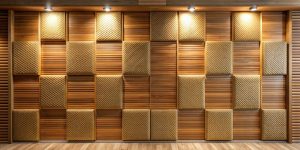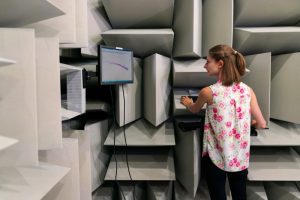The ‘Long View’ of Sound
Good acoustic spaces allow better non-thinking, emotional reactions to sound and music.
There’s a moment early in the movie “Men In Black” – after a big green alien has put up ‘all his hands and flippers’ (and was then blasted to goo) – where an older, tired-out Agent D says to Agent K “They’re beautiful, aren’t they?”
K replies “What?”
And D says “The stars. We never just – look anymore.”
I’m in the sound business, so I don’t have to worry about blasting creatures into goo – nonetheless, I can relate to Agent D’s statement, though about sound, not the stars. I tend to lose my “long view” of sound, because I’m continually focusing on the interior aspects of a sound, not the beauty of sounds themselves – laughter, a nicely-played acoustic guitar, an espresso machine finishing a cappuccino – these are all intrinsically lovely (especially the coffee machine early in the morning). Because my work is listening “critically” to sound, including how a room interacts with sound, for me, leaning back and just listening – as a simple emotional experience – doesn’t happen as often as it should.
And so I’ve found, and you might have, too, that good acoustic environments allow me to more easily lose myself in the long view of sound, to more naturally enjoy my sense of hearing without thinking about it. Few of us contemplate the damage done by lousy acoustical spaces, which separate us from “an enveloping sound experience” – marketing-speak for “simply listening”. The sonic signature of the space we’re listening in, with all the room flaws imposed on the original sound, can easily pull us away from the emotional pleasure of sound itself, even if we don’t know anything about the bad acoustics causing the issue.
Humans have a highly-developed hearing system which has evolved over a very long time to be able to quickly discern danger. Our hearing is especially sensitive to location and directional information (“which way should I run?”), based on timing differences between our two ears. Because stereo sound depends greatly on timing information to create the illusion of space (and reality), speakers and acoustics that disrupt our ability to accurately hear timing, or “phase”, have a harsh effect on how well we receive emotional cues from sound and music.
It might seem like a stretch: closely relating acoustics and a “long view of sound” – but my experience has proven to me that it’s a very important part of fully enjoying sound. If you think about something, you’re probably enjoying it less. In bad rooms, much less. Ultimately, it’s why we Acoustic Geometry people do what we do – everyone deserves to hear sound clearly, without room problems, as much as possible. The stars are beautiful, as Agent D says, and so is sound in good acoustics.















